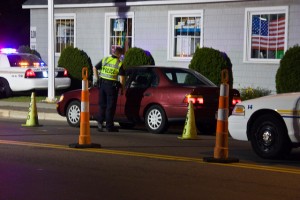 In California, there are four different types of checkpoints where drivers can be stopped by traffic cops; DUI checkpoints, drug checkpoints, TSA checkpoints and U.S. Border checkpoints. DUI and drug checkpoints concern drivers the most and for good reason. When you spot a checkpoint on the road ahead, you don’t have to proceed through it if you can find a different route around it. Yet most drivers proceed to the checkpoint and interact with police and other authorities.
In California, there are four different types of checkpoints where drivers can be stopped by traffic cops; DUI checkpoints, drug checkpoints, TSA checkpoints and U.S. Border checkpoints. DUI and drug checkpoints concern drivers the most and for good reason. When you spot a checkpoint on the road ahead, you don’t have to proceed through it if you can find a different route around it. Yet most drivers proceed to the checkpoint and interact with police and other authorities.
Let’s take a look at what your rights are at each of these checkpoints.
DUI Checkpoints
When you reach a sobriety checkpoint, don’t panic. These are the most common checkpoints in America.
- Police utilize these stops to take a look at drivers to see if they are drunk.
- DUI checkpoint inspections are usually performed quickly.
- Police will typically ask a few questions, check your license and peer into your vehicle to see if there are any open containers or other illegal items.
- They’ll pay particular attention to the smell of your breath as it can indicate if you have been drinking alcohol.
While police are able to stop you for a short moment of time, they are not legally allowed to search your vehicle unless they have probable cause that you are drunk or have been drinking alcohol.
- The police officer may request to search your vehicle without probable cause but you don’t have to give your consent.
- If you do not offer consent and he has no probable cause, he can’t legally search your vehicle. Even if drug sniffing dogs are present, you don’t have to give the officer consent to search your vehicle.
- You are not required to answer the officer’s questions and you are not required to admit that you have broken the law.
Even if you are arrested at a sobriety checkpoint, you don’t have to confess. If you are arrested, contact an attorney at your first opportunity.
US Border Checkpoints
The Department of Homeland Security’s Custom and Border Protection agents perform searches at the United States’ borders without having any probable cause or search warrant. This means that anyone who attempts to cross the border has already consented to having his vehicle and body searched.
- Yet these agents must have reasonable suspicion before conducting a forensics style search of electronic devices.
- However, they can force you to turn on your electronics for a “quick look”.
- You may add password protections to your computer files before attempting to cross the border. Most people do not give agents their passwords.
There are also “border security checkpoints” set up within 100 miles of the border.
- These are highly controversial and you are not required to answer any questions at a checkpoint of this variety.
- You also don’t have to comply with a search at this style of checkpoint either.
Drug Checkpoints
While police can’t set up random drug checkpoints with the specific goal of nabbing drivers with illegal drugs, they do put up signs that indicate that a drug checkpoint is ahead.
- This is basically a trap to pull over people who see such signs and make a u-turn or throw their drugs out of the vehicle’s windows.
- So if you see such a warning sign, just keep driving and refrain from pulling over as it will raise red flags.
TSA Checkpoints
TSA agents at airport security checkpoints are allowed to search you and your possessions without having probable cause or a search warrant.
- These agents might conduct on the spot interviews if you choose to not pass through the body scanners that many consider to be an invasion of privacy.
- Most people answer the questions during the interview in order to pass through the security checkpoint and make it onto their flights.
These were some of the random checkpoints where you can be stopped by the traffic police. However, if you are aware of your rights as a driver, you may be able to save yourself from the waste of time, energy and money without breaking the law.
[Image: https://www.flickr.com/photos/versageek/2819669967]
Scott Desind
Latest posts by Scott Desind (see all)
- How to Request the County Seat and Fight Your California Traffic Ticket - May 21, 2023
- Don’t Even Touch That Cell Phone - July 13, 2022
- Innocent Until Proven Guilty - March 2, 2020

